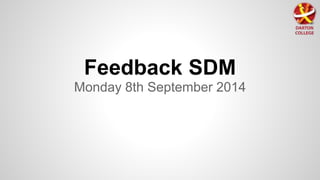SDM feedback 8th sept 2014
- 1. Feedback SDM Monday 8th September 2014
- 2. Connect… as quickly as possible Sometimes feedback isn’t enough
- 3. Activate... your learning + over to you! Diamond 9
- 4. Activate... your learning + over to you!
- 5. Activate... your learning + over to you! No grade and comment most What does research tell us about the principles of effective feedback? effective. It’s not at the end of learning. It needs to clearly give next steps. Used to inform planning. Links to LO/SC. Learners need time to think about and respond to feedback Regular and consistently applied. Stickability.
- 6. Activate... your learning + over to you! Darton Learning Model 1. ‘Default 100%’ 2. Growth Mindset + Ethic of Excellence 3. Tools for learning: environment, BLP, ICT 4. Literacy 5. Highest expectations of learner behaviour 6. Unrelenting curiosity
- 7. Activate... your learning + over to you! An example from Science Click here for the link
- 8. Demonstrate... and ‘show you know’ Not in your department groups... What would we see, hear, feel if feedback at DC was highly effective?
- 9. Consolidate... your learning In your departments... Draft your thoughts for our feedback policy - we will collate and present to CTL’s on Wednesday.
- 10. Best professional self... Embedded Formative Assessment, Dylan William Visible Learning, Hattie Why students don’t like school, Daniel Willingham Can I be that little bit better at using methods to make feedback stick? @DavidFawcett Teacher Learning Blog WCPS Education Endownment Fund Tool kit The Classroom Experiment, video clips - Dylan William #DartonC









